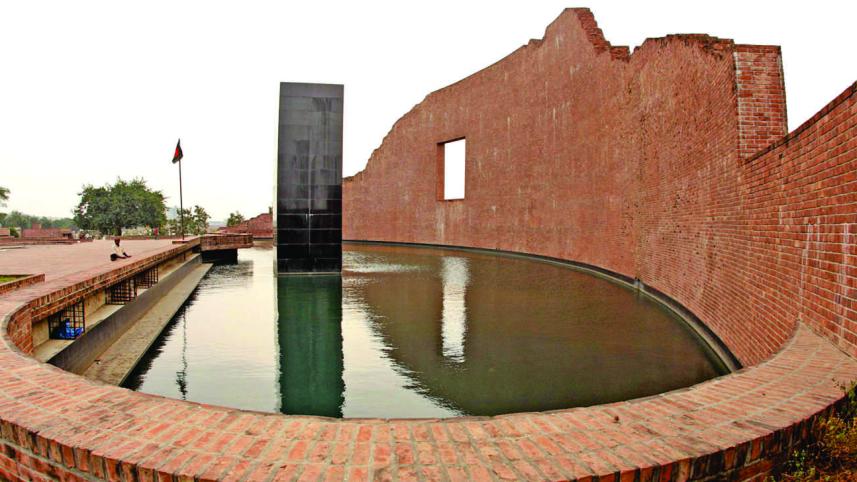Remembering the bright

The recent attacks by a suspected Islamist militant on innocent shoppers in Berlin took me back to the traumatic days of our Liberation War 1971. The targets may be different, but the enemy is the same.
December is a special month: It brings back memories of the liberation of our country in 1971. It's a moment of pride, patriotic affection, gratitude to all who fought for our freedom and our foreign allies especially India and the erstwhile Soviet Union, respectful remembrance of those who laid down their lives.
I was a precocious pre-teen at that time. Independence came at a terrible price. Of the many losses at the time, the murder of intellectuals is a particularly heart-breaking outrage that haunts me to this day.
I continue to feel the loss personally. Dhaka was a small town then. Everybody seemed to know each other. Two martyred doctors, Dr. Fazle Rabbi, a brilliant physician, and Dr. Alim Chowdhury, a superb ophthalmologist, were close friends of my father from their medical college days. (My father, the deceased paediatrician Dr. Badrul Alam, designed the first makeshift ShahidMinar in 1952. He was targeted by the Pakistan Army in 1971, but that's a story for another day.)
My father was deeply immersed in cultural activities during his medical college days, so he knew some Dhaka University intellectuals as well. I recall running into Munier Chowdhury, a celebrated scholar of Bengali literature, at New Market. As my parents exchanged pleasantries with him, I recall being a little star-struck. I was still too young to have read his marvellous anthology of critical articles in Tulanomulok Samalochona (Comparative Criticism) or his hard-hitting book-length appraisal of Mir Mosharraf Hossain in Mir Manas (The Mir Persona). I was awestruck to meet in person the man who introduced me to Shakespeare. Chowdhury had translated Shakespeare's Taming of the Shrew, which was broadcast in Dhaka Television. The Bengali title was Mukhora Ramani Basikaran. It was a top-notch production carried on the broad shoulders of the great thespian Golam Mostafa, and I daresay the first thorough exposure to Shakespeare for the Bengali-speaking audience in erstwhile East Pakistan.
When Dr. Rabbi and Dr. Chowdhury visited our home, my father's eyes used to light up. They chatted with abandon as they reminisced about their student days. History lecturer Ghiyasuddin Chowdhury, a burly bear of a man with a booming voice and the gentlest of natures, was a family friend.
We did not learn of their deaths until after December 16. I can't describe what a pall of sadness it cast on our joy after being liberated by from the Pakistani military monsters.
When we heard about it, the shock and pain was personal. These were not just celebrated intellectuals. Many of these were people I knew, people I had seen talking and laughing. What made it particularly unbearable was that they had not died in battle. These intellectuals were hunted down in cold blood at the cusp of our victory by religious bigots, adversaries who already knew they had lost. So they took one last murderous swipe at intellectuals they had failed to thwart with ideas and argument.
Religious extremists, now and in those days, make a great pretence of moral principle and courage. Yet in 1971, when push came to shove, they took the path of unprincipled barbarity and ultimate cowardice. They realised they would come up short when they take on our intellectuals in the marketplace of ideas. In a free country, they would not have the lopsided advantage of having the support of a foreign reactionary government. They could not kill their ideas, so they killed them physically instead.
It is no easy task to quantify the terrible loss to our intellectual capital. There is one thing that is not mentioned often enough. The intellectuals who were singled out for murder in 1971 had something in common. Both Dr. Rabbi and Dr. Chowdhury, for instance, like pretty much most of the intellectuals targeted in 1971espoused progressive, secular values which religious fanatics during those days viewed with alarm and hatred. That has not changed.
In 1971 they targeted intellectuals, today they target innocent bystanders whether in a restaurant in Dhaka, a shopping market in Berlin, or an art gallery in Ankara. They remain as devoid of humanity and decency as ever, a dark, evil and monstrous force.
I live in hope that the values of a plural, humane, tolerant and inclusive society will ultimately triumph in our country and inthe world.
It won't happen a moment too soon.
The writer is a contributing editor for Siliconeer, a monthly periodical for South Asians in the United States. He has been writing for US-based South Asian media for over 25 years.

 For all latest news, follow The Daily Star's Google News channel.
For all latest news, follow The Daily Star's Google News channel.